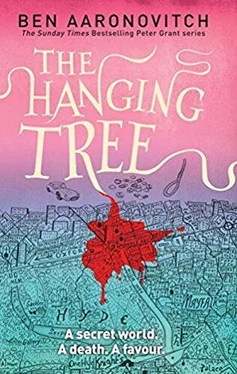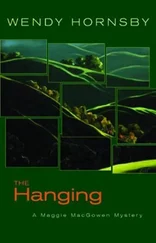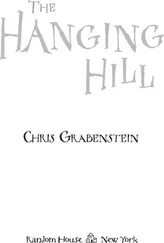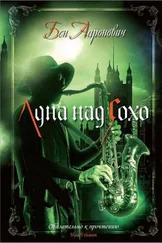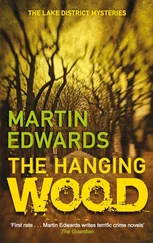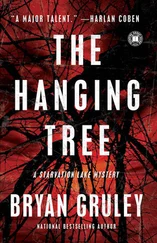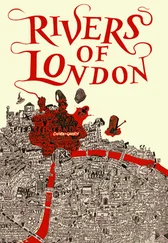As I walked in, I caught a whiff of old sweat and hot pie which might have been bad ventilation or the memory of the crowds that flocked to this end of the Tyburn Road to watch the felons morris at the end of the rope.
Morris being an old word for dance, by the way – it’s amazing what you pick up on the job.
The woman behind the bar was reassuringly Romanian and didn’t flinch when I showed her my warrant card and asked to see the manager. The barmaid explained that she was out getting her lunch, but was expected back any minute. In the meantime would we like a drink?
Not being tied to a brewery chain, The Chestnut Tree offered a range of beers in the mid- to totally obscure CAMRA range. I had a half of Sambrook’s Junction Ale, just to keep everything friendly and relaxed you understand, and Guleed had an orange juice and Perrier.
It wasn’t easy, but we managed to find a table from which we could keep an eye on most of the saloon bar. The table top was made from planks of wood that had grown pitted with use and warped with age, possibly before being lacquered with what looked like about half a centimetre of varnish. Despite the ancient beer rings worn into the surface there was a printed sign in a freestanding iron frame which requested patrons to preserve the natural beauty of the genuine antique furniture, thank you – the management. In front of this was a stack of mismatched beermats. When I had a flick through, I found they were all from different breweries and, where marked, from different pubs. I learnt much later that it was considered good form for patrons to nick beermats from other pubs and donate them to The Chestnut Tree. The really rare ones from places like Tibet or obscure bars in Abeokuta ended up pinned to a cork board behind the stage in the adjoining public bar.
‘They have live music here,’ said Guleed, who’d found a leaflet stuffed into the iron frame. ‘Someone called the “Shanren Mountain Men Band” tonight – ever heard of them?’
I said I hadn’t, nor had I heard of Lol Robinson or Laura Marling who were headlining the coming weekend.
Guleed used an apparent interest in the playbill to give the room the once over. Places like The Chestnut Tree don’t get much of a lunchtime crowd. As a rule, the demi-monde doesn’t work nine to five, and so doesn’t need to get them in before heading back to the office for a couple of hours of pretending to work.
That said, there was a bunch of young men in white shirts in a nearby booth, blue pinstripe jackets flung over the backs of their chairs – two white, one darker who might have been Turkish or somewhere equally Mediterranean. They looked like they might work in an office and I wondered if they knew where they were drinking or if they had wandered in by accident.
In another booth two middle aged women were sitting hunched over their table so that their faces almost touched. One of them was so pale as to be actually white white with platinum blonde hair swept back behind reassuringly unpointed ears. Her friend was pinker, dark haired but with an upward curve to the corner of her eyes that I recognised from some of Edward Linley Sambourne’s illustrations for Charles Kingsley’s monograph on the taxonomy of the Fae. They must have spotted us watching because they both turned to frown at us – I saw their eyes were an unsettling hazel brown. The last time I’d seen eyes that colour I’d been the wrong side of the faerie veil, where I would have stayed if Bev hadn’t turned up in a traction engine and given me a lift out.
Me and Guleed pretended to be interested in our drinks because, you know, it’s rude to stare.
We gave it ten minutes, enough time for me to finish my half, before I went back to the bar and asked after the manageress again. While I did that, Guleed went to stand in the archway that linked the saloon bar with the public bar beyond. We’d decided that was her best position to cover what we reckoned was the door to the staff area and also the steps back-up to the street. This way, should the manageress, or anyone else, make a sudden break for it, Guleed could intercept.
‘She texted me,’ said the Romanian barmaid and held up her phone for me to see. ‘She says she’ll be back soon.’
I looked back and saw that Guleed was talking to a young Chinese guy in a purple open necked shirt, pre-faded jeans and leather trainers. He was short but broad-shouldered, his black hair cut with a long fringe. In his left hand, as if glued in place, he carried a slim bamboo and leather case which I couldn’t definitely identify as a sword scabbard only because of the blue drawstring pouch covering the pommel.
He leaned forward like a bird dipping for fish and said something that made Guleed laugh. I saw her eyes flick in my direction and so did his. He turned to look at me, grinned, and gave me a polite nod and a mocking salute before turning and walking away.
‘That was interesting,’ said Guleed when she joined me. She showed me his card. It was expensive in its simplicity, a good card stock and superior printing. It read MICHAEL CHEUNG in black ink and, in smaller print underneath – LEGENDARY SWORDSMAN, and under that two clusters of Chinese characters. Guleed was reluctant to hand over the card, so I took a picture to send to Postmartin for translation and analysis.
‘He said that he was the new guy in Chinatown,’ said Guleed. ‘And when you had a moment he’d like you guys to drop in at the usual place for dinner. He said Nightingale would know which place.’
‘And it took him ten minutes to say that?’
‘He also gave me his phone number,’ she said.
‘You going to call him?’
‘Probably,’ said Guleed.
‘And if he draws that sword, are you going to arrest him?’
‘That depends, doesn’t it,’ said Guleed. ‘On what he does with it.’
Which was Guleed for ‘mind your own business’, but I might have pursued the matter just a little bit further in the interest of intra-collegial due diligence if the manageress of The Chestnut Tree hadn’t chosen that moment to come back from lunch.
She was a white woman in her late thirties with an oval face atop a rather long neck which she grew her light brown hair long enough to partially disguise. She was wearing a no-nonsense, easy to clean, light pink blouse with black jeans and nice comfortable flat shoes. Her eyes were light brown, but even before I got close enough to see the flecks of hazel-gold around the iris I had her pegged as being fayer than the client list of a New Zealand casting agency.
Her name was Wanda Pourier and she had the kind of Estuary accent that says she could have grown up in London, only her parents moved to the Thames Valley when she was young – presumably to find work in the boredom mines.
‘We’d better talk in my office,’ she said. ‘We don’t want you lot scaring the punters more than you have already.’
The staff area was unkempt and vaguely depressing in the way that staff areas always are. The punters get the gloss and the staff get scabby, peeling walls and lockers that looked like they’d been salvaged from a sunken U-boat. The manager’s office was just a spare bit of space randomly separated off with drywall and fitted with a long shelf down one side that served as both desk and storage space. There was a serious looking free-standing safe as far from the door as possible and the obligatory year planner taking up the free wall. Wanda sat in a battered operator’s chair and motioned us into the two grey stackable polyurethane seats that were the only other furniture.
One thing that was missing was a computer – or even a desk calculator. Instead, an old fashioned gunmetal blue mechanical adding machine stood next to a stack of cheap ledgers, the type with carbon paper interleaves for the keeping of multiple records.
Читать дальше
